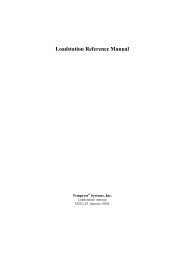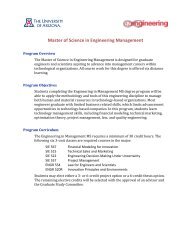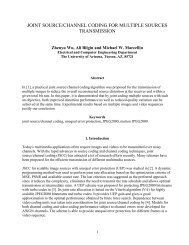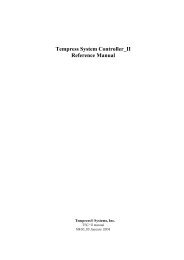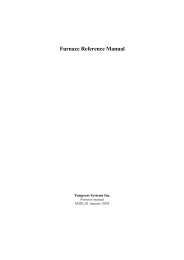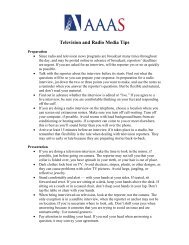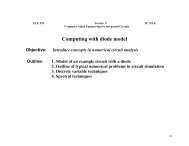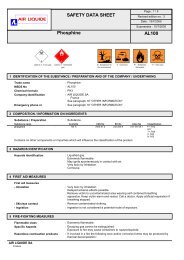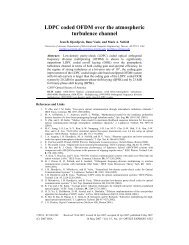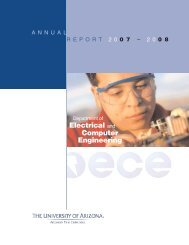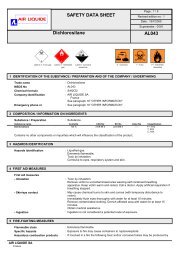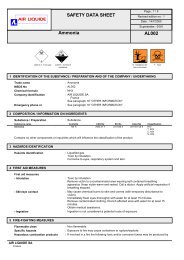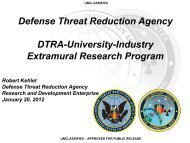aerospace engineering - Department of Aerospace and Mechanical ...
aerospace engineering - Department of Aerospace and Mechanical ...
aerospace engineering - Department of Aerospace and Mechanical ...
Create successful ePaper yourself
Turn your PDF publications into a flip-book with our unique Google optimized e-Paper software.
Responses to the question “What have you learned on the job that should<br />
have been included in your formal education?”<br />
Survey<br />
Responses<br />
Year<br />
2001 * Fundamental business education, project planning/management.<br />
* More focus on communication skills: technical reports/presentations.<br />
* More experience with how graduate school works, allowing for better preparation to go to graduate<br />
school.<br />
* More training in ethics/environment issues. More lab <strong>and</strong> computer experience.<br />
* Brng fits; tolerances; new technology.<br />
* Underst<strong>and</strong> the life cycle for <strong>engineering</strong> projects. Please note that the life cycle mainly falls under<br />
systems <strong>engineering</strong> so taking electives under the industrial <strong>engineering</strong> program would have<br />
helped.<br />
* Automotive <strong>engineering</strong>.<br />
* The technical skills, not appropriate for undergraduate education, best taught at community college,<br />
tech schools, or on the job.<br />
* Design, more practical computer skills.<br />
* Again dealing with budgets <strong>and</strong> business considerations are the weakest area <strong>of</strong> my education.<br />
* As a mechanical engineer, geometric dimensioning <strong>and</strong> to lerancing would have been useful.<br />
* Not so much “team” work but doing your job <strong>and</strong> needing to communicate with many others to get<br />
a final product.<br />
* Optics.<br />
* Add linar algebra, numerical methods for math. In control systems, cover algorithan design, control<br />
system calibrations. More exposure to modern <strong>engineering</strong> tools. Class on IC engines.<br />
* Economics & real applications like piping & ductwork to allow us to interface better with skilled<br />
laborers.<br />
* Importance <strong>of</strong> underst<strong>and</strong>ing personality types <strong>and</strong> maximizing a teams productivity by taking<br />
advantage <strong>of</strong> each persons strengths.<br />
* Organizations Structure<br />
* GD + T.<br />
* Teach solid modeling tools <strong>and</strong> more modern analysis tooks ie, PRO/E, Solid Works, Math Cad,<br />
Matlab <strong>and</strong> Ansis<br />
* 1. Use <strong>of</strong> more s<strong>of</strong>tware that is used in the field. Examples are Pro-Engineering, SAS, Minitab<br />
Visio, Auto Cad, etc. Had good college experience with Office (Exel, Word, Power Point) but these<br />
others I use much more <strong>of</strong>ten!<br />
2. More group stuff. Since working as an engineer, most everything I have done has been in concert<br />
with othere engineers work. I do have work that “is mine” but seldom do I have projects that don’t<br />
requrie fitting into someone else’s design.<br />
3. Add finance/business management course work. I have leaned quickly that cost varies most designs<br />
where I work.<br />
* More h<strong>and</strong>s on with industry tools, ie Pro-E vs. AutoCAD. More multi-person projects without<br />
being able to choose teams.<br />
* Nothing is ever as cut <strong>and</strong> dry in work experience as it is in textbook examples. More <strong>of</strong>ten than not<br />
there is no right answer.<br />
* How to deal with people more efficiently. (communications skills).<br />
* Working with <strong>Mechanical</strong> drawings/Pro-E <strong>and</strong> geometric diminsioning <strong>and</strong> tolerances.<br />
* H<strong>and</strong>s on experience with specific pieces <strong>of</strong> equipment like pumps, boilers, chillers, turbo jet<br />
engines.<br />
* More application start to finish <strong>of</strong> a project (conception to built product) learning.<br />
* Included the following in m<strong>and</strong>atory coursework: Design <strong>of</strong> experiements, galvanic corrosion.<br />
* Statistics, CAD design basics - screws, belts, etc.<br />
* Project planning skills. Cost modeling. Decision making.<br />
(continued on next page)<br />
<strong>Aerospace</strong> Engineering Attachments - Page 87



